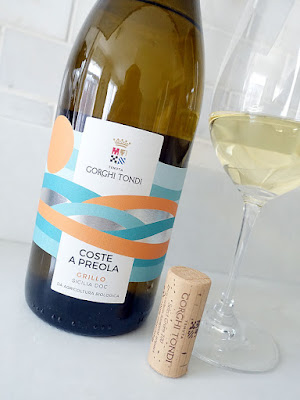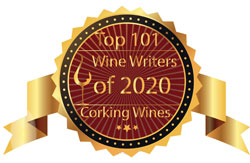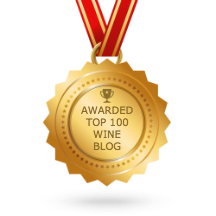red wine reviews are a pair of lovely Tempranillo-based wines from the DO of Ribera del Duero in Spain. The 2022 vintage of this organic red wine arrived at the LCBO in last month's LCBO VINTAGES New Release Collection as part of the mini-feature on wines from Ribera del Duero.
The 2011 Pruno is a bottle I purchased over a decade ago from the LCBO VINTAGES Release. While my notes indicated that I probably should've opened this a few years ago, I figured this would be as good a time as any to open it back-to-back with the current vintage.
Both of these wines are produced by Finca Villacreces, a renowned estate winery situated in Spain's Ribera del Duero wine region with a history dating back to at least 1350, when Pedro de Villacreces, a Franciscan friar, was the first documented resident on the estate. Along with a group of ministers, Pedro cultivated the land, including a small vineyard that was used to make wine for their own use and nearby monasteries.
In 1836, the estate came into private hands, and soon thereafter it held rights over the waters of the Duero river. In the early 20th century, the estate was sold to the Cuadrado family from Valladolid. The Cuadrado family used the estate for various agricultural and recreational purposes, including housing illustrious guests. One of these guests was Peter Sisseck, who used the winery and part of the vineyard to craft the notable Flor de Pingus.
In 2004, the Cuadrado family sold the estate to the father and son team of Gonzalo and Lalo Antón, who already owned wineries in Rioja and Toro. After three years of remodelling and painstaking work to restore the vineyard, Finca Villacreces was once again inaugurated. In 2017, the acquisition of Pinos Claros, within the Golden Mile of Ribera del Duero, extended the estate's reach to 275 hectares of vineyards, 90% of which are organically farmed.
Today, Finca Villacreces is situated in the heart of Ribera del Duero's Golden Mile, amidst a 200-year-old pine forest and bathed to the north by the Duero River. This unique place brings landscape, tradition, and charm together, with a vineyard that is divided into 15 plots that are interspersed with a centenary pine forest. The vineyard at Finca Villacreces is unique because it is conditioned by the diversity of poor soil, which ranges from extremely sandy areas near the pines to the very stony terrain where pebbles from the alluvial deposition of the Duero river predominate.
Finca Villacreces is a 110-hectare estate, with 64 hectares of vineyards. Situated at 700 metres above sea level, the vineyard is subject to an extreme climate with large temperature fluctuations, long winters, and dry summers with low rainfall. However, the surrounding forest protects Finca Villacreces from the most aggressive climatic conditions. The focus at Finca Villacreces is for quality-focused and integrated viticulture, where the vine's natural condition is controlled and preserved in order to obtain wines with the unique Villacreces typicity and personality. Sustainability is also a focus at Finca Villacreces, with some of these initiatives being vineyard adaptation, support for biodiversity, sustainable packaging, and reduction of carbon footprint.
The 2022 vintage of this red wine is crafted with 93% Tempranillo, 6% Cabernet Sauvignon, and 1% Merlot, from grapes grown among the 64 hectares of vineyards located on the estates of Finca Villacreces and Pinos Claros. The average age of the vines is 25 years, and they are trained using a trellis system with light pines. To vinify this wine, the grapes underwent alcoholic fermentation in stainless steel tanks with double pissage (bleed off the juice to increase concentration of colour, tannins, and flavour), followed by malolactic fermentation in a combination of stainless steel tank, oak fermentation vat, and oak barrels. The wine was aged for 10 months in 75% French and 25% American second- and third-use oak.
The growing season in Ribera del Duero in 2022 was marked by the absence of rain and remarkably hot temperatures, which resulted in irregular ripening levels. While the grapes were healthy, they did exhibit below average weight with a higher ratio of skin to pulp. This also allowed producers to pick at their chosen time, which will play a key role in defining the individual wine styles. It was a long harvest with the last Tempranillo picked in mid-November. From a very good vintage with wines displaying very good structure and complexity, let's see how this 2022 Tempranillo from Ribera del Duero is tasting tonight...
This organic red wine is a blend of 93% Tempranillo, 6% Cabernet Sauvignon, and 1% Merlot. The medium+ intensity nose takes some coaxing to reveal ripe, dark berried, black cherry, currant, and sweet vanillan oak aromas surrounding a core of plum and accented with floral violet. The dry, medium+ bodied palate is well-structured with ripe dark berry, black cherry, and currant flavours in a spicy profile. More savoury on the mid-palate with cedary oak, earth, and mineral notes. It has crisp and juicy acidity, along with chalky, drying, and almost astringent tannins. Savoury earth and smoky mineral notes linger on the long, dry finish. Recommended buy that is best enjoyed over the next 2-3 years. Score: 89 pts
FINCA VILLACRECES PRUNO 2011 - DO Ribera del Duero, Spain (#312140) (XD) -$19.95
This blend of 90% Tempranillo and 10% Cabernet Sauvignon pours a very dark purple colour. It has savoury spice, leather, and mature, stewed black fruit aromas rising out of the glass with medium+ to medium-high intensity. Savoury wet earth and sandalwood with touches of dried herb and black currant add nuance, interest, and complexity. The medium-bodied palate is spicy with savoury black fruit, currant, leather, sandalwood, and dried herb flavours. Acids are still quite refresh, while the textured tannins are slightly astringent and drying. Alcohol peeks through slightly on the mid-palate, while savoury earth and woody notes linger on the long and slightly tangy finish. Past prime with little room for further improvement. Serve at cool, red wine temperature and enjoy now! Really smooth and pleasantly mature on the 2nd day. Score: 89 pts
Other lovely wines by Finca Villacreces can be ordered through their Agent - Noble Estates Wines & Spirits.
The 2011 Pruno is a bottle I purchased over a decade ago from the LCBO VINTAGES Release. While my notes indicated that I probably should've opened this a few years ago, I figured this would be as good a time as any to open it back-to-back with the current vintage.
Both of these wines are produced by Finca Villacreces, a renowned estate winery situated in Spain's Ribera del Duero wine region with a history dating back to at least 1350, when Pedro de Villacreces, a Franciscan friar, was the first documented resident on the estate. Along with a group of ministers, Pedro cultivated the land, including a small vineyard that was used to make wine for their own use and nearby monasteries.
In 1836, the estate came into private hands, and soon thereafter it held rights over the waters of the Duero river. In the early 20th century, the estate was sold to the Cuadrado family from Valladolid. The Cuadrado family used the estate for various agricultural and recreational purposes, including housing illustrious guests. One of these guests was Peter Sisseck, who used the winery and part of the vineyard to craft the notable Flor de Pingus.
In 2004, the Cuadrado family sold the estate to the father and son team of Gonzalo and Lalo Antón, who already owned wineries in Rioja and Toro. After three years of remodelling and painstaking work to restore the vineyard, Finca Villacreces was once again inaugurated. In 2017, the acquisition of Pinos Claros, within the Golden Mile of Ribera del Duero, extended the estate's reach to 275 hectares of vineyards, 90% of which are organically farmed.
Today, Finca Villacreces is situated in the heart of Ribera del Duero's Golden Mile, amidst a 200-year-old pine forest and bathed to the north by the Duero River. This unique place brings landscape, tradition, and charm together, with a vineyard that is divided into 15 plots that are interspersed with a centenary pine forest. The vineyard at Finca Villacreces is unique because it is conditioned by the diversity of poor soil, which ranges from extremely sandy areas near the pines to the very stony terrain where pebbles from the alluvial deposition of the Duero river predominate.
Finca Villacreces is a 110-hectare estate, with 64 hectares of vineyards. Situated at 700 metres above sea level, the vineyard is subject to an extreme climate with large temperature fluctuations, long winters, and dry summers with low rainfall. However, the surrounding forest protects Finca Villacreces from the most aggressive climatic conditions. The focus at Finca Villacreces is for quality-focused and integrated viticulture, where the vine's natural condition is controlled and preserved in order to obtain wines with the unique Villacreces typicity and personality. Sustainability is also a focus at Finca Villacreces, with some of these initiatives being vineyard adaptation, support for biodiversity, sustainable packaging, and reduction of carbon footprint.
The 2022 vintage of this red wine is crafted with 93% Tempranillo, 6% Cabernet Sauvignon, and 1% Merlot, from grapes grown among the 64 hectares of vineyards located on the estates of Finca Villacreces and Pinos Claros. The average age of the vines is 25 years, and they are trained using a trellis system with light pines. To vinify this wine, the grapes underwent alcoholic fermentation in stainless steel tanks with double pissage (bleed off the juice to increase concentration of colour, tannins, and flavour), followed by malolactic fermentation in a combination of stainless steel tank, oak fermentation vat, and oak barrels. The wine was aged for 10 months in 75% French and 25% American second- and third-use oak.
The growing season in Ribera del Duero in 2022 was marked by the absence of rain and remarkably hot temperatures, which resulted in irregular ripening levels. While the grapes were healthy, they did exhibit below average weight with a higher ratio of skin to pulp. This also allowed producers to pick at their chosen time, which will play a key role in defining the individual wine styles. It was a long harvest with the last Tempranillo picked in mid-November. From a very good vintage with wines displaying very good structure and complexity, let's see how this 2022 Tempranillo from Ribera del Duero is tasting tonight...
Tasting Note:
VILLACRECES PRUNO 2022 - Vegan, DO Ribera del Duero, Spain (#312140) (XD) - $24.95This organic red wine is a blend of 93% Tempranillo, 6% Cabernet Sauvignon, and 1% Merlot. The medium+ intensity nose takes some coaxing to reveal ripe, dark berried, black cherry, currant, and sweet vanillan oak aromas surrounding a core of plum and accented with floral violet. The dry, medium+ bodied palate is well-structured with ripe dark berry, black cherry, and currant flavours in a spicy profile. More savoury on the mid-palate with cedary oak, earth, and mineral notes. It has crisp and juicy acidity, along with chalky, drying, and almost astringent tannins. Savoury earth and smoky mineral notes linger on the long, dry finish. Recommended buy that is best enjoyed over the next 2-3 years. Score: 89 pts
FINCA VILLACRECES PRUNO 2011 - DO Ribera del Duero, Spain (#312140) (XD) -
This blend of 90% Tempranillo and 10% Cabernet Sauvignon pours a very dark purple colour. It has savoury spice, leather, and mature, stewed black fruit aromas rising out of the glass with medium+ to medium-high intensity. Savoury wet earth and sandalwood with touches of dried herb and black currant add nuance, interest, and complexity. The medium-bodied palate is spicy with savoury black fruit, currant, leather, sandalwood, and dried herb flavours. Acids are still quite refresh, while the textured tannins are slightly astringent and drying. Alcohol peeks through slightly on the mid-palate, while savoury earth and woody notes linger on the long and slightly tangy finish. Past prime with little room for further improvement. Serve at cool, red wine temperature and enjoy now! Really smooth and pleasantly mature on the 2nd day. Score: 89 pts
Other lovely wines by Finca Villacreces can be ordered through their Agent - Noble Estates Wines & Spirits.

























